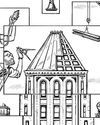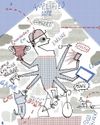
IN THE 2019 PwC Global Crisis Survey, 69 percent of respondents said they expected a global crisis in the next five years, most likely due to a financial meltdown or technology failure. Little did they know how soon the crisis would come. Just nine months after the survey was released, an entirely different and unexpected medical and public health crisis — COVID-19 — has fundamentally altered the world. If driving change in the uncertain and turbulent environment that existed at the beginning of 2020 was a complex challenge, the degree of difficulty has now been ramped up significantly.
As we recently noted in these pages, five global forces — asymmetry of wealth, disruption, age disparities, polarization, and loss of trust — which together we’ve termed ADAPT, were already changing the way millions of people live and work (see “Adapting to a new world,” s+b, May 13, 2020). The pandemic has sharply accelerated these forces. As a result, organizations have even less time than they thought to reconfigure themselves so that they can maintain their viability in a vastly changed world. In our new book, we predict that humanity has “10 years to midnight.” But with events moving so quickly, it seems there may be even less time until the fateful hour. The good news is that by recognizing the challenges confronting society, internalizing the lessons of the pandemic, and deploying the tools and technologies at hand, we can chart a new, more adaptive course. But doing so is going to place a fresh set of demands and intense pressures on leaders.
The six paradoxes of leadership
This story is from the Winter 2020 edition of strategy+business.
Start your 7-day Magzter GOLD free trial to access thousands of curated premium stories, and 9,000+ magazines and newspapers.
Already a subscriber ? Sign In
This story is from the Winter 2020 edition of strategy+business.
Start your 7-day Magzter GOLD free trial to access thousands of curated premium stories, and 9,000+ magazines and newspapers.
Already a subscriber? Sign In

Transforming information into insight
Focus on six organizational elements to build a world-class data and insights capability.

THE URGENT NEED FOR SOPHISTICATED LEADERSHIP
The pandemic has highlighted a series of paradoxes inherent to the work of leaders. What comes next will depend on how well leaders face up to them.

The road to successful change is lined with trade-offs
Rather than trying to convince people your change initiative is the right one, invite them to talk openly about what it might take to implement it: the good, the bad, and the frustrating.

Sustaining productivity virtually
Maintaining productivity levels among remote employees is an enduring challenge. Here are five ways to help businesses and employees thrive while people work at home.

FORWARD TO normal
Entertainment and media companies are building business models that are resilient to the enduring changes in consumer behavior ushered in by COVID-19.

How leaders can promote racial justice in the workplace
Embrace four principles to turn today’s diversity, equity, and inclusion initiatives into sustained progress.

CREATING THE OFFICE OF THE FUTURE
In a remodeled world, it is vital for companies to reinvent ways of working.

Consumer companies must take leaps, not steps
As shoppers show how quickly they can adapt to external shocks, retailers will need to radically reconfigure their business models.

Businesses can fast-track innovation to help during a crisis
“Unrealistic” timelines can actually work. Here’s how.

Agility and experience management work better together
Many companies achieve early wins with separate transformational efforts, then stall. But if combined and enhanced using “return on experience,” or ROX, measures, these two programs can unlock each other’s potential.